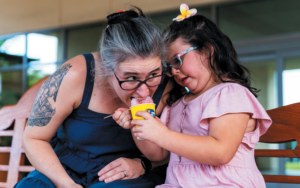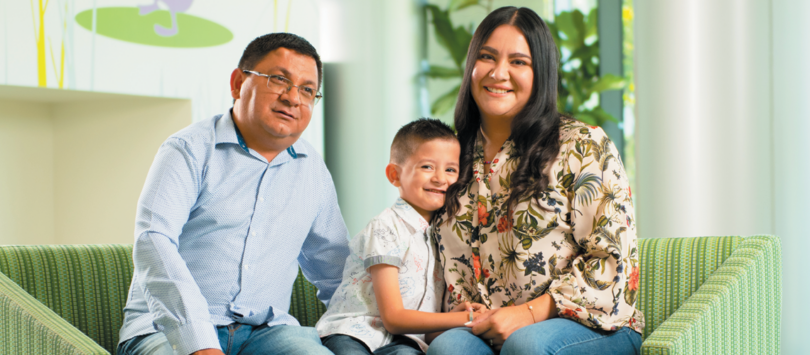For parents with children facing complex medical needs, care doesn’t only happen in the hospital — a great deal happens at home, as well. Family caregivers manage medications, change dressings and coach their kids through rehabilitation exercises — all while coping with the day-to-day challenges of parenting. The responsibility can be overwhelming.
At Shriners Children’s, nurses and other clinicians are tuned in to the demands this places on family caregivers. Caregivers are not just seen as parents — they are vital partners in the care process. Our nurses and clinicians recognize the immense physical, emotional and mental toll of caregiving and work to support families every step of the way.
“Being a caregiver to a child with long-term healthcare needs is difficult and particularly demanding because you are raising the child also,” said Argerie Tsimicalis, Ph.D., RN, a nursing researcher with Shriners Hospitals for Children Canada. “It’s a complex role.”
Dr. Tsimicalis said Shriners Children’s providers are particularly good at recognizing that they are partners with the family and that family caregivers are vital healthcare team members.
“Everybody talks about the Shriners Children’s magic, and it really is a magical place. We try hard to support the families,” Tsimicalis added.
A family’s journey: Meagan and Connor

By addressing the unique challenges of family caregivers, Shriners Children’s ensures they feel equipped, supported and valued — a vital component of our collaborative approach to pediatric care.
When Meagan’s son Connor was born with proximal femoral focal deficiency, a condition affecting the length and structure of his femur, she and her husband opted for leg-lengthening procedures instead of amputation and a lifetime of using prosthetic devices. But there was no way she could foresee that this path would require 13 surgeries over the years, countless physical therapy sessions and an unwavering commitment to Connor’s well-being.
Meagan had to quit her job to focus on Connor’s care, including multiple trips per week to Shriners Children’s St. Louis for therapy. Shriners Children’s nurses became her trusted partners, guiding her through tasks like cleaning surgical wounds, managing dressings and learning to adjust Connor’s leg-lengthening device.
Nurses as partners, not just providers
Tara Newman, RN, the inpatient nurse manager at Shriners Children’s Spokane, said that while nurses and other caregivers want to give as much information and advice as possible, they are also careful not to overstep their bounds. Parents have been caring for their children more closely than anyone, and they know what works.
However, they are also careful not to make assumptions about how much moms and dads know about caring for their kids.
“Typically, when families come in with children who have complex medical needs, they are the experts,” she said. “Our nurses learn from family caregivers when it comes to physical care and the best approach for their children. The part that we play is identifying needs that haven’t been addressed already.”
Nurses instruct and guide parents who help with therapy exercises, change dressings or use equipment. However, Merlene Jose, RN, manager of care management at Shriners Children’s Hawai‘i in Honolulu, said that often, what family caregivers need most is support and resources for themselves.
“It can be very physically, emotionally and spiritually draining, because caregivers don’t get a break,” Jose said.
Supporting the whole family
Jose also highlighted the wrap-around care nurses provide to support families. “Caring for children means caring for their families, too,” she said. “Caregivers don’t get many breaks.” Shriners Children’s nurses often go above and beyond to alleviate some of this load, finding small ways to provide relief. One simple way nurses help parents recharge is by encouraging them to rest while their child is asleep or take short breaks by offering to play with the kids or take them for a walk. “Sometimes, it’s just about giving the parent a moment to breathe or reconnect with other family members,” Jose explained.
A commitment to compassion
Shriners Children’s nurses and clinicians aim to ease the caregiving journey and ultimately achieve the best outcomes for patients, including Connor, through hands-on education, emotional support and small acts of kindness.
Connor’s two legs are now even in length, and all his surgeries should be behind him, his mom Meagan said. Connor enjoys riding his mountain bike and plays the trumpet in his school’s marching band. It seems now that all the effort was absolutely worth it, she added.
“I can’t say enough about Shriners Children’s,” Meagan said. “They really changed our lives.” By addressing the unique challenges of family caregivers, Shriners Children’s ensures that family caregivers, such as Meagan, feel equipped, supported and valued — transforming the care experience for children and families alike.





